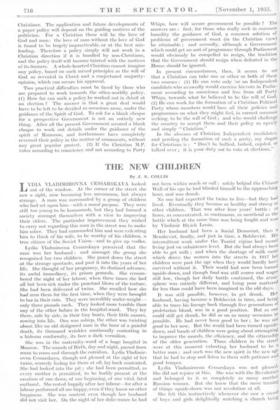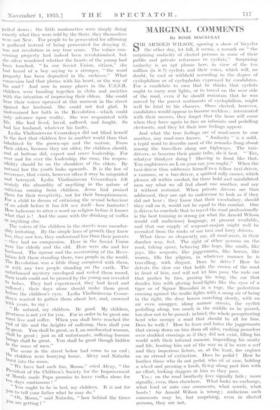THE NEW CHILDREN
By J. S. COLLIS
LYDIA VLADIMIROVNA CESSARSKAYA looked out of the window. At the corner of the street she saw a sight, now becoming less uncommon, but always strange. A man was surrounded by a group of children who had set upon him—with a moral purpose. They were still too young to be kornsomols, but they had' formed a society amongst themselves with a view to improving their elders. The particular improvement they wished to carry out regarding this man in the street was to make him sober. They had surrounded him and were exhorting him to think of his wife, to be worthy of his children, a true citizen of the Soviet Union—and to give up vodka.
Lydia Vladmirovna Cessarskaya perceived that the man was her husband : and amongst the group she recognised her two children. She gazed down the street at the strange spectacle, and past it into the years of her life. She thought of her pregnancy, its destined advance, its awful, immediacy, its prison grounds. She remem- bered the night of her labour, when three times she had all but been sick under the punctual blows of the torture. She had been delivered of twins. She recalled how she had seen them for the first time, when they were brought to her in. their cots. They were incredibly under-weight- only three pounds each. They looked more terrible than any of the other babies in the hospital ward. They lay there, side by side, in their tiny boats, their little canoes, rowing into life. One was asleep, the other was twisting about like an old disfigured man in the hour of a painful death, its thousand wrinkles continually contorting in a hideous conformity, its face a dark vermilion.
She was in the maternity-ward of a huge hospital in Moscow. The sounds of Birth, day and night, passed from room to room and through the corridors. Lydia Vladimir- ovna Cessarskaya, though not pleased at the sight of her twins, scarcely feeling for them at all, lay back contented. She had looked into the pit ; she had been permitted, as every mother is permitted, to be bodily present at the creation of one dawn, of one beginning, of one vital, fatal outburst. She rested happily after her labour—for after a labour performed all are happy, even if they know no other happiness. She was content even though her husband did not visit her. On the night of her deliverance he had not been within reach or call ; safely behind the Chinese Wall of his ego he had blinded himself to the approaching hour, and was drunk. No one had expected the twins to live—but they had lived. Eventually they became as healthy and strong as other children. That was after four years' battle : fls fierce, as concentrated, as continuous, as sacrificial as the battle which at the same time was being fought and won by Vladimir Illyich Lenin.
Her husband had been a Social Democrat, then Menshevist, finally, and just in time, a Bolshevist. His intermittent work under the Tsarist regime had meant living just on subsistence level. • But she had always been able to get milk ; and when the shortage of milk came which drove the women into the streets in 1917 her children were past the age when they would hardly have survived without it. Their world had. now been turned upside-down, and though food was still scarce and wage' still low, though her daily battle continued, the atmo. sphere was entirely different, and being poor mattered far less than could have been imagined in the old days.
It was still possible, however, to get drunk. Her husband, having become a Bolshevist in time, and being able to trace his lineage back through five generations of proletarian blood, was in a good position. But as one could still get drunk, he did so on as many occasions es possible. He had never been good to her ; he was not good to her now. But the world had been turned upside' down, and bands of children were going about attempting to improve the morals, the efficiency, and the citizenshiP of the older generation. Those children in the street were at this moment exhorting her husband to be better man ; and such was the new spirit in the new age that he had to stop and listen to them with patience anti good temper. Lydia Vladimirovna Cessarskaya was not pleased' She did not rejoice at this. She was with the Revolution and belonged to it as completely as many another Russian woman. But she knew that the mere turning of things upside-down was not revolution at all. She felt this instinctively whenever she saw a crowd of boys and girls delightedly watching a church being pulled down : the little marionettes were simply doing exactly what they were told by the State, they themselves were not New. For people to be persecuted for affirming a godhead instead of being persecuted for denying it, was not revolution in, any true sense. The values con- cerning property had indeed been revolutionised, but she often wondered whether the hearts of the young had been touched. " In our Soviet Union, citizen," she had heard of a boy saying to a stranger, " the word Property has been • deposited in the archives." What connexion had that phrase with his heart; or the way of his soul ? And now in many places in the U.S.S.R. children were banding together in clubs and societies with the intention of improving their elders. She could hear their voices upraised at this moment in the street against her husband. She could not feel glad. It hridermined her faith in the Revolution—which could Only advance upon reality. She was acquainted with life. She had lived, loved, suffered, and fought. So had her husband, whatever his faults.
Lydia Vladimirovna Cessarskaya did not blind herself to the fact that children live in another world than that inhabited by the grown-ups and the mature. From their elders, because they arc older, the children should, and at bottom did, expect and crave leadership. For ever and for ever the leadership, the onus, the respon- sibility should be on the shoulders of the elders. By natural law the youth looks upwards. It is the law of reverence, that exists, however often it may be misguided and betrayed. Lydia Vladimirovna Cessarskaya felt acutely the absurdity of anything in the nature of criticism coming from children. Jesus had praised them for their receptivity, not for their bumptiousness. 1' or a child to dream of criticising the sexual behaviour of an adult before it has felt sex itself—how fantastic ! lioiv ludicrous to utter a word on religion before it knows What that is ! And the same with the drinking of vodka or anything else. The voices of the children in the streets were unendur- ably irritating. By the simple laws of growth they knew less, they saw less, they understood less than their parents --they had no compassion. Here in the Soviet Union Were Were the elderly and the old. Here were she and her husband. The uproar and the overturning of the Revo- lution left them standing there, two people in the world. The Revolution was a little thing compared with them, or with any two people standing on the • earth. The unfathomed mystery enveloped and veiled them round, their truth could not be pierced by the young nor revealed to babes. They had experienced, they had lived and suffered ; their clays alone should make them great before the children's eyes. Lydia Vladimirovna Cessar- KaYa wanted to gather them about her, and, crowned with years, to say : • "Be natural, my children. Be good. My children, greatness is not yet for you. For in order to be great one °lust live and suffer. When you shall have reached the 1,id of life and the ,heights of suffering, then shall you h great. You shall be great, as I, an uneducated woman, shall be great ; just as all unfortunate, suffering human beings shall be great. You shall be great though hidden In the mass of men."
The scene in the street. below had come to an end ; the children were hurrying home. . Alexy and Natasha burst into the room.
• !` We have had such fun, Mama," cried Alexy, " the 1--resident of the Children's Society for the, Improvement ten Morals made Papa promise to leave vodka alone for ten days continuous ! " " You ought to be in bed, my children. It is not for You to tell your father what he may do." • " Oh, Mama," said Natasha, " how behind the times You are getting I "



























































 Previous page
Previous page